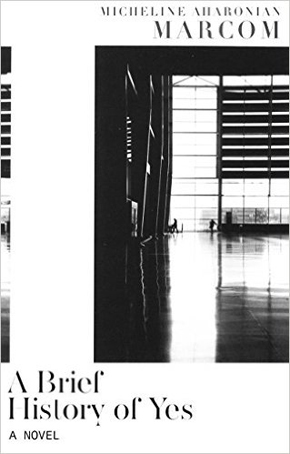Future Memory
reviewed by Tatiana Ryckman
Micheline Aharonian Marcom, “A Brief History of Yes”
Dalkey Archive Press
2013, 98 pages, paperback, $12.60
So that, yes, here are the two lovers again.
–Marcom
 Micheline Aharonian Marcomʼs “A Brief History of Yes” is a sequel to her forth book, “Mirror in the Well.” But distinctly different from the intricate ebb and flow of complex emotion in that earlier work, “A Brief History of Yes” contains the broader strokes of Marcom’s prose, leaving readers with a powerful feeling of emptiness. Not empty of content, but with the palpable, empty feeling of endings. Marcom writes, “For as the lover of yes knows, the absence created by the end of a love affair is another form of presence.”
Micheline Aharonian Marcomʼs “A Brief History of Yes” is a sequel to her forth book, “Mirror in the Well.” But distinctly different from the intricate ebb and flow of complex emotion in that earlier work, “A Brief History of Yes” contains the broader strokes of Marcom’s prose, leaving readers with a powerful feeling of emptiness. Not empty of content, but with the palpable, empty feeling of endings. Marcom writes, “For as the lover of yes knows, the absence created by the end of a love affair is another form of presence.”
The lovers of “A Brief History of Yes” make histories, they create futures; they have former lovers, husbands and future lovers, they have countries and jobs—they have identities to build and lose, they are attached to and torn from each other. Maria, the beloved, is torn between many responsibilities: allegiance to her home country of Portugal, her fraction of Armenian blood, and the American ground she lives on, the American men she fucks—loves—the American women she grows wary of. She dreams of Pai, her dead father, whose admonishments she narrowly escaped from first by leaving Portugal with her mother, and then in each new lover who wishes her to be happier, easier to love.
The affair chronicled in “A Brief History of Yes” lasts, “from dry season to dry season.” The cyclical pattern of the novel is followed by a grouping of song birds that watch the beginning and ending of each affair from outside of Maria’s window. Maria falls in with the lover, a wealthy white man, living in his own history of building and decomposing. His cycle begins in the hopeful face of someone who is different, but it ends because he always deems them the same and so he begins looking again. He continues, like the songbirds outside of Mariaʼs window, and like Maria, searching the faces of the men she sees in the street or bars or coffee shops to which to say yes.
Was it language robbed yes of its yesness? Or the symbolic forms for sounds, and then the writing down and the making thereby, of ledgers, of books, of fixed ideas and seemingly permanently marked-up and marked-down things? Took the lover from the beloved, and the hermit thrush sings today in the grove by Mariaʼs house. –Marcom
Maria creates a history for herself and her lover, but this imagined future is filled with events that will never happen, plans she pledges to, but can leave without ever having to touch. Yet when losing her lover, her identity, Maria mourns the loss: “the corpse of the dream that I had in your house…like a journey ended in the middle of the wide black sea.” And in mourning, in choosing to develop the intricacies of her wound she does not say yes. It is “an exile: from her country, from love, and from yes today.”
Marcomʼs depiction of the future is one without the memories of our countries and lovers, but one with the memories we create of the future. She begs us to ask ourselves how our bodies and minds can say yes to a new lover when remembering the pain of the former.
So when Maria continues to say yes, against the history of her lost lover, she looks to the invented histories of the future and looks back on past she has not lived. Instead, what she learns from the ghosts that follow her from old cities to the rooms of her lover, is to return like the songbird to the trees, always to leave and to return again, to make a new past, so that Maria can continue to say yes. She, “looks at each man in every pub and cafe, the supermarkets and standing in all of the lines of bakeries of administrative offices and thinks is it you, are you the next lover, are you the one who […] says yes?”
“A Brief History of Yes” is the end of the affair, the end of a year, the end of all affairs, of all years. “And does the corpse return, does death?” Maria wonders in the happy middle of the affair after dreaming of ghosts, and she seems to answer, many months after the affair is over because, “the hermit thrush has departed…. Until the next season, the migration northward for the spring singing, the finding of a new mate in the forests of the Earth.” And the bird, the lover, the beloved, “arrives departs arrives again until all things eventually arrive at their end.”
 Tatiana Ryckman is the author of “Twenty Something” (ELJ 2014). Her work has appeared on Tin House’s The Open Bar, Keyhole Press, theNewerYork, The Doctor T.J. Eckleburg Review, and The Boiler Journal. Tatiana was an artist in residence at Yaddo, and leads Creative Writing workshops through The University of Texas at Austin and her local library.
Tatiana Ryckman is the author of “Twenty Something” (ELJ 2014). Her work has appeared on Tin House’s The Open Bar, Keyhole Press, theNewerYork, The Doctor T.J. Eckleburg Review, and The Boiler Journal. Tatiana was an artist in residence at Yaddo, and leads Creative Writing workshops through The University of Texas at Austin and her local library.

0 comments on “Reviews: Micheline Aharonian Marcom”